The Story Behind The Social Network
All the facts behind the Facebook movie…
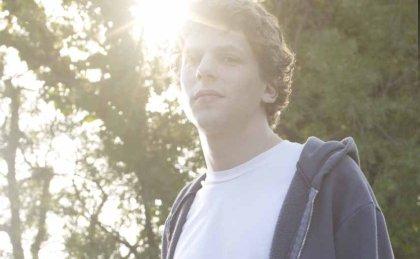
If you’re not on Facebook, you might as well be dead.
That, it’s pretty safe to assume, is currently the world’s consensus on the social networking website. Now boasting 500 million users worldwide, 1,400 employees, and revenue of $800m, Facebook is the place to be.
It looks like Se7en director David Fincher agrees; he’s made a movie about the interweb phenomenon entitled The Social Network . It’s something that, as far as we can tell, has never been done before – a movie based entirely on a website.
But with West Wing scribe Aaron Sorkin on scribbling duties, Fincher behind the lens, and Facebook CEO Mark Zuckerberg in no way involved, The Social Network should prove to be anything but your run of the mill bandwagon jumper.
“A lot of exciting things happened in 2004,” says Facebook co-founder Dustin Moskovitz, “but mostly we just worked a lot and stressed out about things.
“The version in the [ film ’ s ] trailer seems a lot more exciting, so I'm just going to choose to remember that we drank ourselves silly and had a lot of sex with co-eds.”
What’s really going on with the so-called Facebook Movie? Let’s log on to find out…
Next: Mark Zuckerberg says... [page-break]
Mark Zuckerberg says I’m trying to make the world a more open place
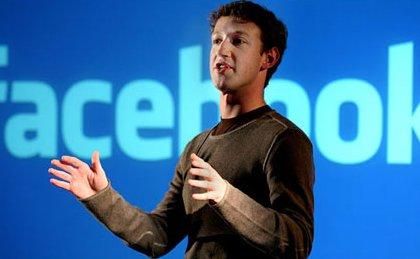
It’s been parodied by everybody from the chaps in The IT Crowd to the nippers in South Park (in episode ‘You Have 0 Friends’). It’s a global phenomenon that means you can stalk your enemies and run a farm. And it’s apparently costing our economy £123m in lost productivity every single day, thanks to office drones staving off boredom by logging on.
But Facebook was never intended to be the sledgehammer worldwide success that it has become. Like the best of stories, it had the humblest of beginnings.
In October 2003, Harvard sophomore Mark Zuckerberg created a website called Facemash. Similar in tone and style to Hot Or Not, the site placed pictures of Harvard students side by side, and asked the surfer to rate who was more attractive.
Fair ‘dos. Shameless shallowness aside, the idea’s a sound one. Except, Zuckerberg hacked into Harvard’s computer network to nab said photos.
Mere days after the site was launched, it was shut down, and Zuckerberg was charged with violating security, copyright and individual privacy, and threatened with expulsion.
The hard figures, though, spoke for themselves – within the first four hours of being online, Facemash garnered 420 visitors and 22,000 photo views. Zuckerman had hit upon something.
“What we're trying to do is just make it really efficient for people to communicate, get information and share information,” Zuckerman told Time magazine in 2007, three years after he launched ‘Thefacebook’ from the very same Harvard dorm room.
The website was a network for Harvard students, with fellow students Eduardo Saverin joining as a business manager, Dustin Moskovitz a programme developer and Andrew McCollum a graphic artist. One month after opening, in March 2004 the site began accepting members from Stamford, Yale and Columbia, as well as Ivy League schools.
Next: Aaron Sorkin says... [page-break]
Aaron Sorkin says I struggled before I started writing this…
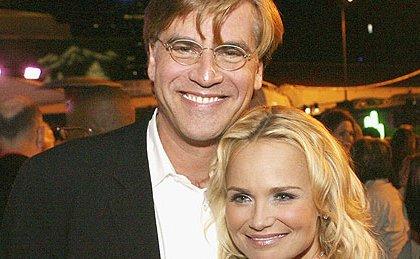
In 2008, author Ben Mezrich received a call from Eduardo Saverin, the Harvard student who had first helped Mark Zuckerberg with ‘Thefacebook’ as a business manager.
Pushing through a messy legal case against Zuckerberg, who wanted to dilute Saverin’s stake in the company and remove his name from the masthead, Saverin thought Mezrich might like to write a book about the creation of Facebook – from his perspective, naturally.
A Harvard grad himself, Mezrich was renowned for writing searing, Hollywood-beckoning non-fiction novels that throbbed with drama – and fill in the fact gaps with a little artistic license. Needless to say, he jumped at the chance.
Producer Scott Rudin got whiff of the novel, which was published in 2009 under the title The Accidental Billionaires: The Founding Of Facebook, A Tale of Sex, Money, Genius, and Betrayal, and went to Hollywood bigwig Amy Pascal.
With Sony interested in turning the concept into a movie, but with no real idea how, Rudin thought he had found the perfect man for the Facebook movie in the form of Aaron Sorkin.
Renowned for his film scripts A Few Good Men and The American President , but even more so as the creator and scripter of TV shows The West Wing and Sports Night , Sorkin’s verbose, wordy writing style seemed a perfect fit for the movie.
“I struggled before I started writing this,” Sorkin admits to The New Yorker , having signed on in early 2009. No surprise there, considering that any initial hopes the minds behind Facebook would be involved in the movie were quickly dashed when the website’s global communications head made demands that Rudin was unwilling to grant.
“Once we got past the fencing,” the producer says, “I said, ‘What would have to happen for you to want to cooperate?’ And Elliot Schrage said, ‘You have to not call it Facebook, and it would have to not take place at Harvard.’ So it was fairly clear that we weren’t going to be working together.”
Sign up for the Total Film Newsletter
Bringing all the latest movie news, features, and reviews to your inbox
Next: David Fincher says... [page-break]
David Fincher thinks it was an amazing idea…
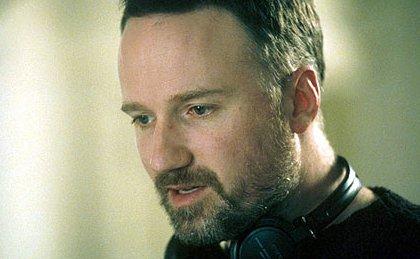
Your last movie was about a man who is born wrinkled and old, and gets younger as he gets older. You’ve directed crime thrillers, Jodie Foster, and something involving a xenomorph. What do you do next? You make a movie about a website, of course.
Not that that is exactly how David Fincher looked at The Social Network – for him, it was all about “the people, the story, the setting, and finally the notion of old world business ethics and morals (as represented by Harvard) in the information age.”
After reading Aaron Sorkin’s mammoth 162 page screenplay (co-star Justin Timberlake waxes: “What was in the script was like showing up at Willy Wonka's chocolate factory. It was a delicious script”), Fincher knew he had to move fast.
“When I read it, it felt to me, ‘We better be doing this now.’ We better not wait nine months to start. It felt like it was talking about ‘now’ - being a twitterer, being a twit, or twat, or whatever. It felt like it needed to be as close to the crater of this explosive technology as it could be. It seems to me like a year from now is too late.”
Famously meticulous in his approach to crafting movies, Fincher found himself occasionally butting heads with the similarly fastidious Sorkin.
Next: Jesse Eisenberg says... [page-break]
Jesse Eisenberg says I don’t use Facebook…
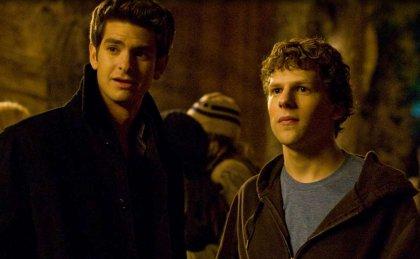
When it came to the casting process, Fincher “cast quickly”. No calls, recalls and re-reads, the director followed his instincts and “went with the best actor’s initial take”.
For the all-important role of Mark Zuckerberg, Jesse Eisenberg seemed like the perfect fit. Not only had he showed a geeky wit with roles in Zombieland and Adventureland , but he also had a shady past of internet obsession…
“When America Online came out, that was a very early incarnation of social networking with the instant messaging,” the actor says. “I was like 13 years-old and my friends and I would come home from school and instant message each other for hours!”
More importantly, the New York native was in just the right place to want to take on something a little bit more challenging than his previous films.
And a challenge Eisenberg got. As he soon discovered, someone like David Fincher comes with his own unique and slightly chaotic approach to making a movie.
One particular scene – the opening, in which Zuckerberg talks with his girlfriend – is a typically wordy brain-throbber courtesy of Sorkin. And Fincher wasn’t going to make it easy for his cast. Far from it, he put his actors through 99 takes of the scene.
Eisenberg embraced the situation, though.
“We’re asked about the great amount of takes almost as though the actors are in opposition to doing that, and every actor I know would stay there all day if there’s more film in the camera,” he explains.
“The alternative is sitting in the trailer. So it was an absolute blessing to do it and we’re all thrilled for the amount of time we were able to spend actually acting and not sitting around waiting to act.”
Next: Dustin Moskovitz says... [page-break]
Dustin Moskovitz says it is interesting to see my past rewritten…
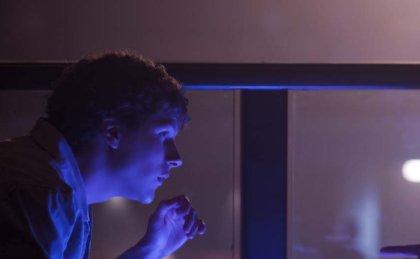
“This is a story of a time and a place and a friendship and a bunch of dreamers and people who saw what the future was going to be like and tried to capitalize on it and the acrimony that broke out between them as they all realized that it was even bigger than they thought.”
That’s David Fincher’s take on the movie that he’s created. Others seem to agree with him.
For those who’ve seen it, the film has been described as “a virtuoso modern parable about greed, innovation, and betrayal”, “a sweeping look at the mind, our generation and era, and our future”, and “a glib little morality tale dressed up in trendy togs”.
“The collective ‘ugh’,” that first heralded the announcement of a Facebook movie, as Sorkin puts it, has all but evaporated in the face of Fincher’s final product.
“People were reacting negatively to the movie they imagined it was going to be,” Sorkin says, “which was people friending each other and poking each other and falling in love on the social network. Which it obviously is not.”
“Originally, when I heard the phrase ‘Facebook movie,’ I thought, ‘Is it just going to be a bunch of people on Facebook?’ Facebook sucks,” echoes Trent Rezner, who wrote the film’s score.
They needn't have worried - the film has been embraced the world over by critics and moviegoers alike.
But what did the real people being portrayed in the movie think of it?
“Honestly,” Zuckerberg has said, “I wish that when people try to do journalism or write stuff about Facebook, that they at least try to get it right. The reason why we didn't participate is because it was very clear that it was fiction from the beginning.”
Adds Dustin Moskovitz: “It is interesting to see my past rewritten in a way that emphasizes things that didn't matter, and leaves out things that really did. Other than that, it's just cool to see a dramatisation of history.”
The Social Network opens on 15 October.
Like This? Then try...
Sign up for our free weekly newsletter here .
Follow us on Twitter here .
Josh Winning has worn a lot of hats over the years. Contributing Editor at Total Film, writer for SFX, and senior film writer at the Radio Times. Josh has also penned a novel about mysteries and monsters, is the co-host of a movie podcast, and has a library of pretty phenomenal stories from visiting some of the biggest TV and film sets in the world. He would also like you to know that he "lives for cat videos..." Don't we all, Josh. Don't we all.


